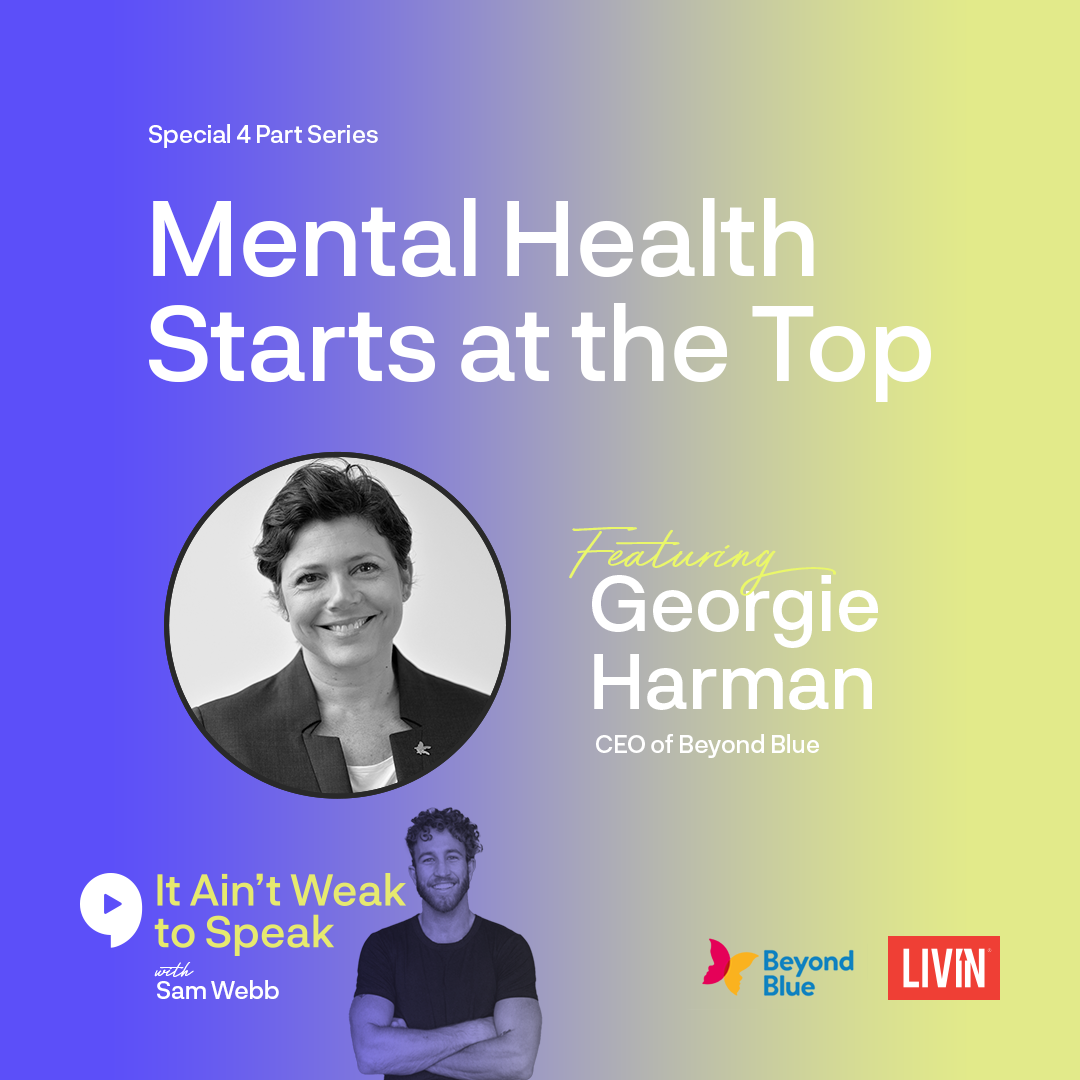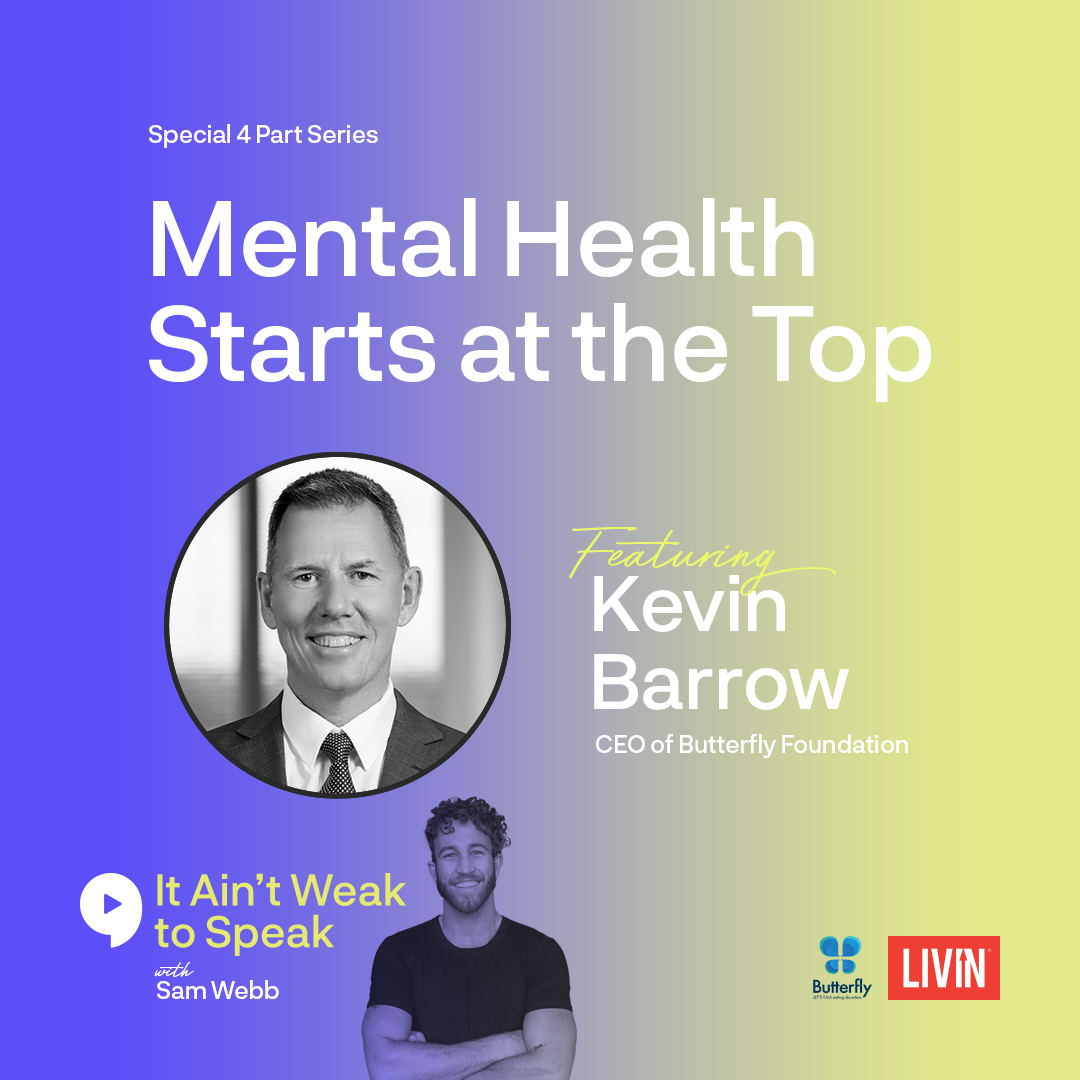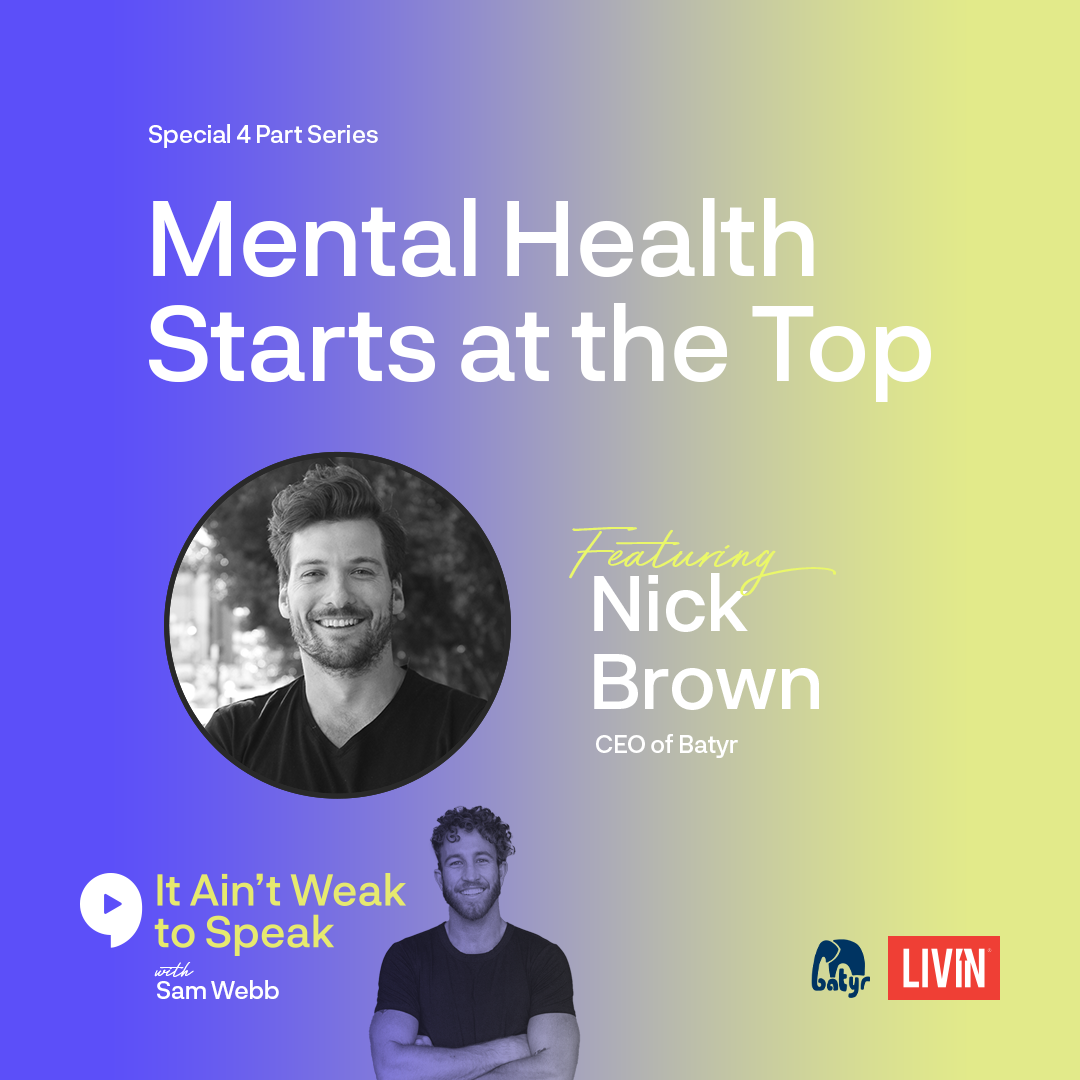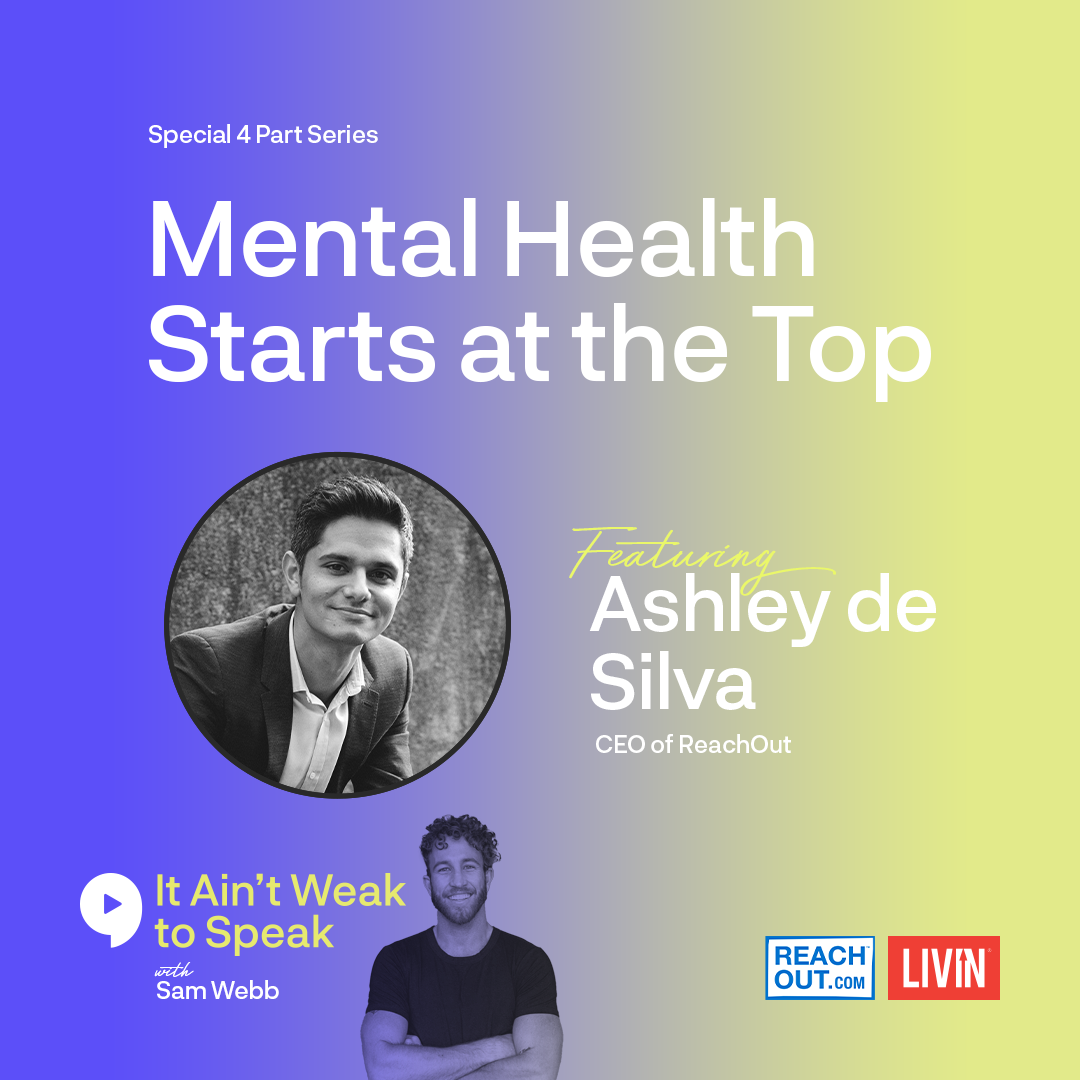LIVIN enlists 4 of Australia’s leading CEO’s in the mental health sector to discuss what can be done to break the stigma
Contact
LIVIN enlists 4 of Australia’s leading CEO’s in the mental health sector to discuss what can be done to break the stigma
Given the huge focus on mental well-being, and the climbing rates of mental ill-health across Australia, LIVIN Co-Founder, Sam Webb, spoke to four CEO's working in the mental health sector on what their organisation is about, how government funding is being spent, and hopes for improved mental health outcomes for Australians in need of support.
Given the huge focus on mental well-being, and the climbing rates of mental ill-health across Australia, LIVIN Co-Founder, Sam Webb, spoke to four CEO's working in the mental health sector on what their organisation is about, how government funding is being spent, and hopes for improved mental health outcomes for Australians in need of support.
#itaintweaktospeak
The four-episode podcast series highlighted common goals, especially a call for state and federal governments to work closer together on funding models, the importance of alternative approaches to the traditional hospital system for those with acute mental health issues, and the power of community and connection.
With millions of Australians turning to Beyond Blue for help every year, they are Australia’s most well-known mental health organisation and focus on supporting people affected by anxiety, depression, and suicide. Georgie Harman, the CEO of Beyond Blue shares her perspective on the current mental health system within Australia and why it’s not yet where it needs to be.

Georgie says there needs to be a holistic and people focussed collaborative approach with the mental health sector, government, and community involvement.
“12.9million Aussies turn to us every year” she tells LIVIN, “We need to transform what we do because the system needs change, we all need to change”. Known for her decisiveness and personable leadership style, Georgie leads by example, having left in her wake the successful diversification of the organisation’s activities and a growth in innovative solutions and digital offerings over her tenure.
However, it is the immediate importance of reaching out during this global pandemic that is really driving Georgie’s message. “This year's been all about connection” Georgie emphasises with the attentiveness and yet subtlety she is well renowned for, “this year's been all about us reminding ourselves of what is important in life”.
"Of course, governments must play a pivotal role, but the idea that we just point the finger at the government and say you've got to fix this is both naive and wrong. Governments have a massive role to play, but it's about the sector lifting its game and working better together. It's about us as a sector continuing to work really closely with governments and giving them really pragmatic, practical advice," says Georgie.
“Emergency departments can be challenging places for people in crisis, because they're chaotic, they're noisy, there's bright lights. The amazing staff in EDs are really under the pump, rushing around, saving people's lives, but there's often no alternative for ambulance and police other than to take someone to the emergency department, and our police service has actually become a proxy mental health service. They've become the front line. The bottom line is that we don't have a system, and the system that we do have is really focused on where providers are and not where people are. We need to redesign the system so it's about people and it's about not just treating the problem that they present with, but actually seeing all the parts of their lives," adds Georgie.
The Butterfly Foundation offers support for eating disorders and body image issues. It's estimated that close to a million Australians are touched by an eating disorder with up to a quarter of eating disorders experienced by men.
Butterfly advocates on behalf of people impacted by negative body image, eating disorders, and those who support and care for them. CEO, Kevin Barrow, agrees that our hospitals are not the best environment for those mentally unwell.

"Very often if you have an eating disorder in Australia, you end up in a hospital in an acute setting and the focus is very much on your physical symptoms rather than the underlying psychological symptoms. It's no fault of the hospital, but there's a gap that needs to be filled.
"Part of understanding how to do that comes down to listening to the voices of lived experience and listening to those people and their families who are going through those experiences and knowing we have the voices of experience behind us, gives us the power to challenge at a government level for change,” Kevin tells Sam.
Kevin says to improve the health care system especially in the mental health space collaboration is critical.
“When I first came into not-for-profit sector, someone said to me, it's a bit like a "collabpetition" (collaboration meets competition) ...everyone collaborates until they need to survive and they need funding, so it then becomes a competition for the funding."
At Batyr, CEO, Nic Brown, is passionate about ensuring that collaboration and lived experience being vital in shaping relevant mental health services.

"At Batyr we've spent a lot of time listening to young people. We spend a lot of time having young people help drive our decision making with tens of thousands of people a year filling out our surveys. We've got these amazing rich insights from young people, and what they're saying on the ground. Organizations need to work closer together and look at sharing their learnings with each other or with the right people to make sure that we can have an influence on the system outside of our own individual mission," says Nic.
Batyr is a youth mental health organization. "We're all about smashing the stigma around mental health and trying to change the help seeking rate. Currently, only about 20 or 30 percent of young people that need to get support are getting it."
We just want to make sure everyone feels comfortable to look out for each other, work out how to look after ourselves and get the support they need. So that's the main thing we do. A big part of what we do is train people to share their stories and we have developed a new storytelling app," says Nic.
Ashley De Silva, CEO of Reach Out is adamant that our mental health services need to be constantly evolving to keep up with our changing world. "When delivering a service from a funding model that might have been conceptualised 10 years ago, things date very quickly, and it can be really hard on the organisation to deliver the service of today, while you're still thinking and trying to design the service of tomorrow," says Ashley.

"You can't just take a traditional service and put it online. You have to think about how you create digital first services and then that is a very different thing. Sometimes, being "online" is not necessarily the same thing as being "digital", particularly when you think about young people where their digital benchmark is high, particularly this generation they are digital natives." explains Ashley.
Reach Out is the world's first online mental health service focussed on people aged 12 to 25. Reach Out says 75% of people with a mental health issue will have it emerge before the age of 25. Statistics in Australia also show that young people with a mental health issues are most likely to go to friends and family, parents, and online for support.
Ashley says it's important parents feel prepared and able to respond because depending on the response at home, it makes a big impact on whether that young person will seek help, and what their own attitudes are about mental health.
"Young people across Australia can login anonymously at Reach Out and share what's going on with them. Sometimes that can be questions or fears, sometimes it can be successes and wins, and sharing back with others what's worked for them. It's an amazing community where you see young people playing this incredible role in validating one another's experiences and encouraging them to take the sometimes scary and big steps to be well," adds Ashley.
Working collaboratively, Reach Out partnered with Lifeline and Beyond Blue, to look at search terms a person used to arrive on a site and whether they were accessing suicide related information. Ashley explains from the data they can build a hypothesis that person might be one of the 13 percent of young people at Reach Out who's at risk of suicide right now.
“And what we're then able to do is create a pop-up chat which invites you to speak to someone immediately. We are not a crisis provider, but we partnered with Lifeline, who is,”
Ashley says the silver lining in Covid, is that Australia has done a good job of recognising very quickly the mental health relationship to the experience of Covid.
Casey Lyons, CEO at LIVIN says, "at LIVIN we rely on our corporate sponsorships to enable us to offer life-changing LIVINWELL programs into secondary schools and workplaces. This podcast series is an example of the great work being done by organisations to break the stigma around mental health. At LIVIN we will continue to have conversations and encourage people that #itaintweaktospeak." To find out how your business can get involved click here.
To listen to the LIVIN CEO Podcast series click here.




